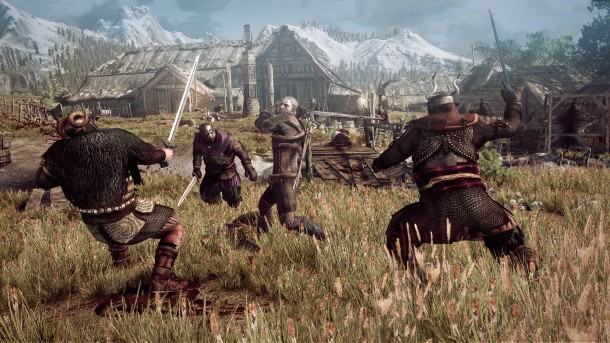
It probably goes without saying, but The Witcher 3: Wild Hunt has some really big shoes to fill. Games like the original Witcher introduced a rich world of unbelievable complexity to an unsuspecting PC audience, whereas Assassins of Kings followed that up with a tale of murder and conspiracy that I’ve found to be unrivaled to this day. The Witcher 3 is a different beast altogether, as it trades in those closely curated, linear experiences for an open world, which is a big shift for the series.
That’s not to say it’s any less, though. Compared to its predecessors, The Witcher 3 is just as dense and complex as far as the rich RPG and combat mechanics go, and the almost unbelievably large open-world that it boasts really can make it an intense and overwhelming experience. In fact, I find it difficult to accurately describe just how massive the world of The Witcher 3 really is in conversation. From the moment you wrap up the tutorial segment and are dropped into the sprawling world, it becomes immediately apparent that it’s a bigger game than those that came before it.
The landscapes don’t feel as dense as those in other games, but in a way that makes sense, as real environments aren’t actually packed with secrets and passages to discover under every bush. That’s not to say it’s barren, though. Littered throughout the world you’ll find all sorts of side quests, roving packs of monsters and bandits, ravaged townships filled with clues and items and the like. It makes finding all of those really cool, out of the way bits feel super rewarding in a way I haven’t really experienced since Skyrim. This all makes the world feel very lived in and authentic, which is a refreshing change in design. Pair that with a dynamic weather system a full day/night cycle and it creates what is one of the nicest open worlds I’ve ever seen.
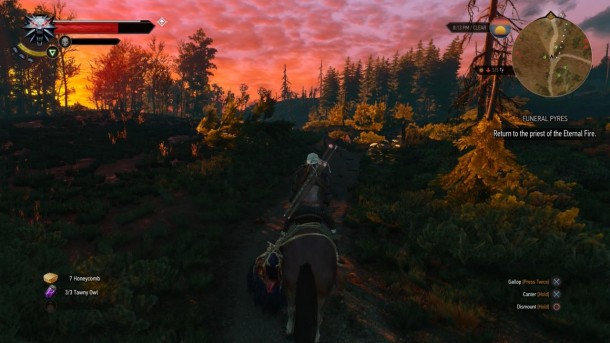
The new open-world design does have clear ramifications on the structure of the game’s story, as it has you globetrotting from one end of the world to another then back again and can sometimes feel like a real slog for the amount of exposition it’s doling out. But when the story really started going I found it to be gripping and extremely well done, albeit with some odd choices in character development in the game’s back half.
Our adventure starts in a multi-continent search for Yennifer, Geralt’s long-lost lover and companion, and his surrogate daughter Ciri. Those two threads serve as much of the motivation for Geralt’s actions in the first 20-30 hours of the game, and are where I found the game to be a bit tedious. It falls into the classic trappings of this style of open-world adventure where the big, badass adventurer is running minor errands for people all over the world so information is drip fed to him. It’s not bad, per se, but it’s a far cry from the feeling of unraveling a great conspiracy that was presented in Assassins of Kings.
Where the main quest drops the ball at times, the side activities pick it back up and run with it. Seemingly inconsequential activities like finding an old woman’s missing frying pan open up much larger quest lines that are at times more fleshed out and interesting than the main story, and by ignoring them and making a b-line through the main quest would see much of the game’s best content falling by the wayside, and actually affect the relationships and support you have later on in crucial moments.
An added benefit of tackling Geralt’s optional quarries is that they greatly increase and otherwise sparse loot distribution model. What ultimately pushed me into doing every side activity I could find was running into some pretty nasty difficulty spikes, as my level was fine but my gear was absolute trash and dulling way too fast against aggressive enemies. Indulging in the activities helped progress Geralt’s abilities and ultimately made the game a much more enjoyable, as that character progression and gear tinkering is incredibly impactful.
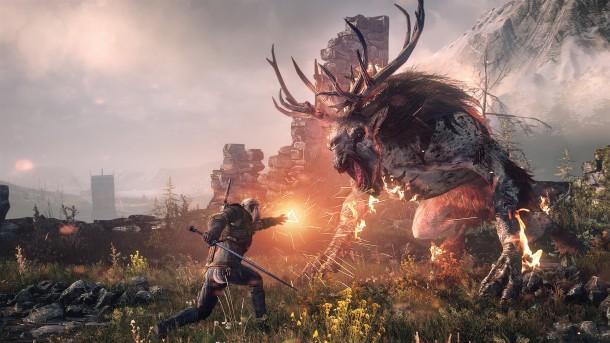
Relative to Assassins of Kings, the game definitely feels as if the RPG systems have been streamlined in some ways. Crafting and alchemy are way simpler and properly explained, so potion-making and armor-crafting will be a non-issue so long as you have the materials. The same can be said for the game’s “Signs” (combat spells), and for the first time I felt like I fully understood what I was doing when using them in a fight. On the flip side, the inclusion of ability altering “mutagens” taken from slaying monsters made some things infinitely more complex. All in all it made it a much better experience, though.
All potions, poisons and oils restock after a rest with the use of some alcohol, which makes them feel like a much more realistic and practical option than they were in previous games, and as such I found myself toying with them a lot more, even if it does go against the official Witcher lore.
Such simplifications, when used in conjunction with the game’s greatly improved and incredibly responsive (not to mention brutal) real-time combat system. Past games have felt clunky and fairly vague, combat in The Witcher 3 feels fluid and deeply satisfying, and I found myself diving straight into dangerous situations just so I could knock bandits on their asses and watch the heads roll. I certainly felt more in control than I ever have in this series.
That’s not to say it’s perfect. Character movement outside of combat was extremely clunky and at times unwieldy at launch, but as of the 1.07 patch a new movement option was introduced which greatly improves the movement and feels a lot more natural and in line with other modern games of its type.
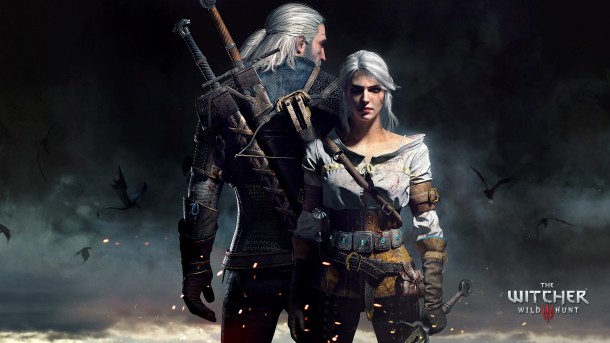
It’s also worth noting that while the third in a series, you can jump right into The Witcher 3 and feel perfectly fine, as aside from a brief Mass Effect-style interview earlier in the game to set the state of the world, the game doesn’t touch on earlier installments all that much. It certainly helps to have a foundation in the lore, as Geralt’s relationship with Ciri would feel as if meeting a if going based off the games alone, whereas the novels paint a much clearer and more vivid picture of the relationship between the two. Asking someone to play two games and read a series of Polish fantasy novels is a bit excessive though, and not necessary in this reviewer’s opinion.
I keep coming back with a feeling the game is just overflowing with things to do, which I never thought I would say. Where I stand, with about 100 hours logged and the main story long since wrapped up, I still haven’t touched the monster hunting Witcher contracts and a ton of secondary quests, let alone Gwent, the game within the game with a completely different ruleset and set of mechanics that I cannot even begin to wrap my head around.

That’s all when the game works, though. For around two months I was plagued with a slew of technical issues with the game. The most common bug I came into contact with caused the game to lock up at a load screen and then be unable to load up a save file again unless I cleared the cache and did a hard reset of my Xbox One with the power cable removed. Nine times out of ten, that bug would have me just turning the game off for the night, because the hassle of braving the spider den that is the area behind my entertainment center was too daunting a task, and I would just boot up another game or read a book instead.
At one point my save file was just gone, so I had to play through the first 15 hours of The Witcher 3 a second time. Going through that ordeal again and with much less patience resulted in a pretty awful experience wherein one major character central to the main plot met a grisly and untimely demise because, quite frankly, I couldn’t give two shits about it at that point. I should note that I do feel bad about it in retrospect.
Most of my issues with the game were remedied with the huge 1.07 patch that hit months after release, fixing movement and countless other bugs. It was a much smoother experience, for sure, but I did run into several issues even then wherein maps would freak out and whole sections of major cities wouldn’t load in, but with an open world game of that scale, I expect that level of jank. I could play the game to completion, and that’s all I really wanted.
All that notwithstanding, The Witcher 3: Wild Hunt is a masterpiece of modern open-world game design and (when it works) is one of, if not the best western RPGs I’ve played in my life. While the main quest can be a bit hard to get through at times, the fact that I always had the option to run off and do something else kept it fresh for the dozens of hours I spent with it. It sets a new standard for what a game of it’s ilk should be, and it will be one hell of a hard standard to live up to.
This review is based on a copy of The Witcher 3 for Xbox One sent to SideQuesting by the publisher

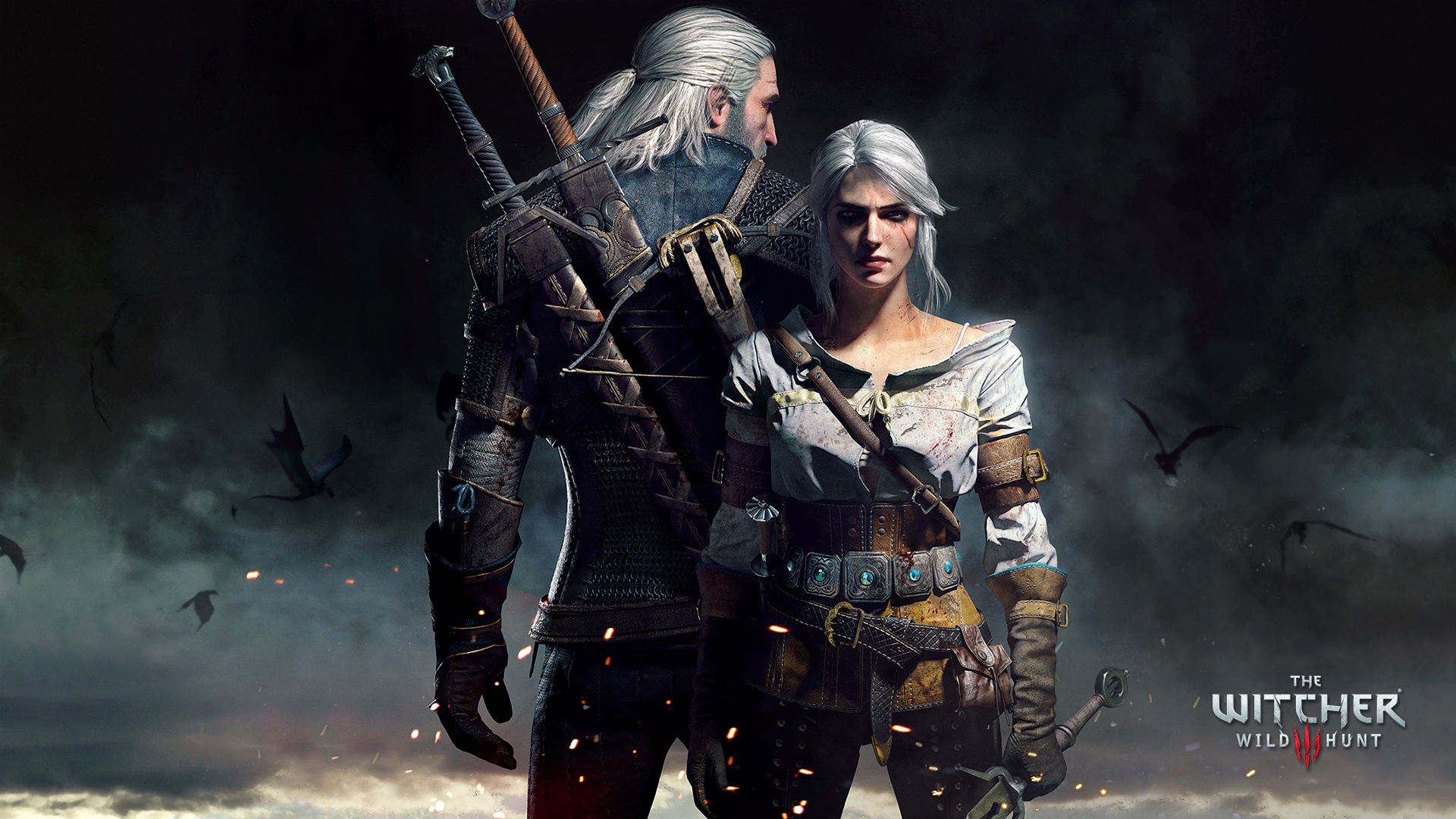

No Comments